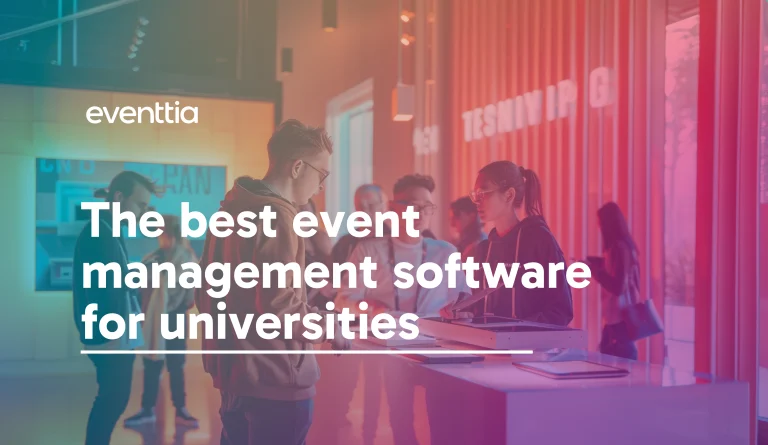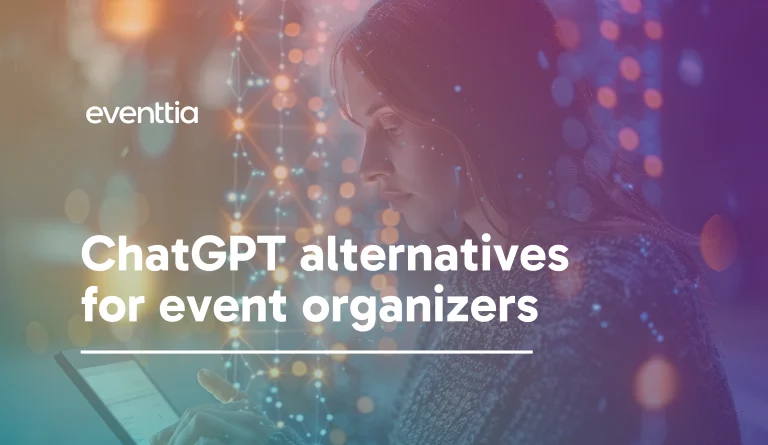How to Create a Successful Event Website: Quick Summary
Why does your event need a website?
An event website is more than just a promotional tool, it acts as the central hub for all event details, streamlines registration, and builds credibility with your audience. Here’s why it matters and what to include:
Boosts registrations: A well-designed site optimized for SEO helps potential attendees find and sign up for your event more easily.
Serves as an info hub: Dates, times, agenda, speakers, sponsors, pricing, and FAQs all live in one place, reducing friction in the decision-making process.
Strengthens professionalism: A dedicated event website builds trust and signals quality, making your event feel legitimate and well-prepared.
Collects valuable data: Analytics show traffic, drop-offs, and demographics, helping you refine marketing and improve future events.
Drives conversions: Features like ticket sales, online payments, and strong CTAs ensure visitors can register without leaving the site.
Supports engagement: Social proof, testimonials, and visuals (photos, videos, infographics) increase attendee confidence and excitement.
Integrates with event tech: Platforms like Eventtia let you build the site with drag-and-drop tools, while also managing registration, payments, and analytics in one place.
While there are many ways to spread the word about your event, creating an event website is a great way to expand your reach and connect with more potential participants. In fact, 80% of event marketers use a website to get more registrations for their event.
However, event websites are much more than just a place to attract additional attendees, and offer several other benefits and uses that can help your event succeed. In general, these websites are solely focused on your event and act as sources of important event information and details.
This guide goes over everything you need to know about event websites, including why they’re so important, what they may include, and tips to ensure yours is as high-quality as possible.
Reasons Why It’s Necessary to Have an Event Website
If you’re wondering if your event even needs a website, the answer is almost always yes. Whether you’re hosting a large convention or a small conference, here are some reasons why it’s crucial to create a website for an event.
It Promotes the Event and Attracts More Attendees
37% of event marketers say that driving registrations is a top challenge for them. Thankfully, having a well-designed website may help you increase event registration and better promote your event.
For example, if you use search engine optimization (SEO) well and ensure your site has a good design and valuable content, you can rank high on search engines like Google. This will get you more eyes on your website and event, which may often translate into more registrations.
Today, if someone wants to learn about something online, many head over to a search engine. As a result, if you don’t have a website, people searching for an event just like yours won’t be able to find you online, which may cost you potential attendees.
It’s a Hub for all Information
An event website serves as a comprehensive resource that anyone can use to learn important information about your event. Instead of potential attendees having to view multiple social media posts or go from resource to resource to find all key details, your website makes it easy for them to learn everything in one place.
This makes their buying journey much quicker and more streamlined. If a person needs to learn the dates of the event in one place, the speakers attending in another, the pricing details in a social media post, and then use another platform to register and pay, they’re more likely to get frustrated and abandon the process.
It Creates a Professional Image of Your Company and Event
A website for your event helps boost your credibility and make you and your event look more professional. If you don’t have a website, some potential attendees may be hesitant about your event and its quality.
A well-designed site gives participants peace of mind that you’re legitimate and builds trust in your event and brand as a whole. It also shows visitors that you’ve put time and effort into the website, and highlights that you’re taking the event seriously.
It Provides Valuable Data
Your website also helps provide you with useful data about your audience. Looking through your site analytics can help you collect event data like demographics, registration numbers, traffic, conversion rate, attendee interests, and more.
These analytics also show you which pages people are engaging with the most, where they spend the most time, and which pages people are abandoning at higher rates. This helps you improve your site in the future and can even help you better learn the journey that most people take throughout your site.
Important Information to Have On Your Event Website
Key Event Information
You want to make an effort to ensure your website contains all the important details regarding the event. This includes the event name, event date and time, , a basic description of the event, event program, list of speakers, sponsors and the sorts of things that’ll happen there.
These details can also be displayed prominently, so that potential attendees don’t have to search for them on your site. Generally, putting them near the top of the home page content or even in/around the header is a good idea.
You can also include:
Beyond these main components, some other things you may want to include on your event website include:
- Event program: An interactive calendar of what’s happening at the event
- Speaker bios
- Vendor and sponsor information
- An event map
- A frequently asked questions section
- Links to your social media accounts
A Way to Register and Buy Tickets
Event Registration Powered By Eventtia
For best results, ensure your website has a place where you can sell tickets and collect online payments from those who register for your event. You want to make it as easy as possible for potential attendees to register and buy tickets, to reduce the chances of them being overwhelmed or confused by the process.
If you don’t have this feature on your site, many people may abandon the registration process at the finish line, as they don’t want to navigate to a different site or platform to finalize the purchase.
Also, to increase the chances of people registering, ensure you use strong and action-oriented calls to act early and often.
Social Proof or Testimonials
According to Gartner research, 90% of buyers say that some sort of social proof influences their research stage when making purchase decisions. As a result, make an effort to include some testimonials, social media posts, videos, or quotes from past attendees on your website.
It’s a great way to build trust, give potential participants peace of mind, and ease any worries or anxieties they have about your event. If someone is aware that others have had a positive experience with something, they may be more open to trying it themselves.
Your Branding
Not everyone who visits your event website will be familiar with your event or company, so you may want to highlight your branding when possible. This includes your logo, company colors, company name, and the name of the event.
This branding could be present throughout the website, but it’s especially important to have on the home page, as that is where many potential participants will start their journey on your website.
Compelling Visuals
While the text content of your event website is important, it’s often the presence of compelling visuals that keeps people interested. In fact, visual content gets 94% more views than text-only content.
The kinds of visuals you may want to have on the site include photos, videos, event trailers, infographics, graphs, charts, or presentations. These visuals can provide value to readers, improve the look of the website, or directly tie into the “vibe” of the event.
While visuals can be placed throughout your website pages, you may want to make an effort to focus on the above-the-fold area. This is the part of your site that’s visible without needing to scroll down. This is so crucial because visitors spend 80% of their time above the page fold on websites.
Best Practices for Creating an Event Website
Source:
Overall:
"We love Eventtia's comprehensive and flexible solution and services. They help us build great event experiences for our attendees."
Mario Pino
Comfenalco Antioquia
Here are a few tips to help ensure your event website is high-quality and provides you with the best possible results.
View and Evaluate Industry Examples
To ensure your site is up to par, it’s a good idea to check out other high-quality event websites for inspiration. This research can help with choosing your design, deciding the content to feature on the site, the calls to action to use, and more.
For example, this event page by French aperitif brand Lillet is a great model of how to highlight your brand, as the first thing you see when you load the page is a few delicious cocktails, with the Lillet brand front and center. The rest of the page is also well-made, as it provides information about the event, doesn’t leave out any key details, and lays out exactly what you need to do to participate.
Another great example of an event website is the one that Cartier made for its Women’s Initiative. It’s a comprehensive resource that attendees can use to learn the theme of the event, the itinerary, the featured speakers, the venue, and practical details like the dress code, transportation, and how to access the venue. It also has a clean and subtle design, as well as a clear navigation scheme.
Of course, if you’d rather go a little simpler and basic, while still being high-quality, this event page for The Art of Movement exhibition is a good example to get inspiration from. It has a clear and distraction-free design that provides details about the exhibition, a map of the location, the opening hours, and an easy way to book.
Integrate Your Event Tech
Integrating your event management platform directly with your site often allows for benefits like seamless registration, streamlined data sharing, efficient workflows, automated ticket sales, and improved marketing efforts. These can save you a ton of time and manual effort, and free you up to focus on more strategic matters.
Some types of event platforms even let you build the website itself. For example, Eventtia provides a drag-and-drop website editor that lets anyone create an event website quickly and easily. It offers you helpful templates, numerous structure and format options, and advanced customization tools to personalize your site.
So if you’re ever stuck wondering how to create an event website, Eventtia can help. But in addition to building your site, platforms like Eventtia also help you manage every aspect of your event, including registration, tracking analytics, managing payments, measuring event performance, and marketing your event.
Choose an Aesthetic and User-Friendly Design
Making a good first impression with your website is important, as stats show that visitors form an opinion about a website in around 50 milliseconds. If your site isn’t appealing or interesting immediately, many people may simply click away.
When designing your event website, make sure it looks amazing, with a clean layout, an attractive color scheme, and fonts that are easy to read. But in addition to looking good, ensure the site is user-friendly, too. It could have intuitive navigation, a straightforward menu structure, and a consistent design so people don’t get lost or confused.
Also, make sure the website loads quickly and performs well, as 40% of online users say they would leave a site if it takes more than three seconds to load.
Optimize for Mobile Devices
As of Q4 of 2024, over 61% of worldwide website traffic comes from mobile devices. Because of this, it’s more important than ever to ensure your website works well on all devices, and isn’t just responsive on a desktop computer.
Some ways to optimize your event website for mobile devices include using a responsive design that adapts to different screen sizes, reducing file and image sizes, and ensuring your navigation is touch-friendly.
Also, make sure to test the website on numerous devices of all sizes to ensure it’s performing well. In a similar vein, make sure to take accessibility seriously and use things like alt text for images and proper color contrast to help as many people as possible be able to interact with your site without any issues.
Key Takeaways
Whether you want to reach more potential attendees or give your participants a single destination to learn everything about your event, creating an event website is a great idea. To ensure your event website is high-quality, make sure to include compelling visuals and social proof, as well as key details about the event and a way to register and/or buy tickets.
Also, don’t forget to integrate your event tech for a streamlined experience, view event website examples in your industry for inspiration, and make sure to optimize your site so that everyone can view it without a problem, no matter what device they’re browsing on.
Discover how Eventtia helps world-leading brands digitize and scale their events
Learn moreShare





